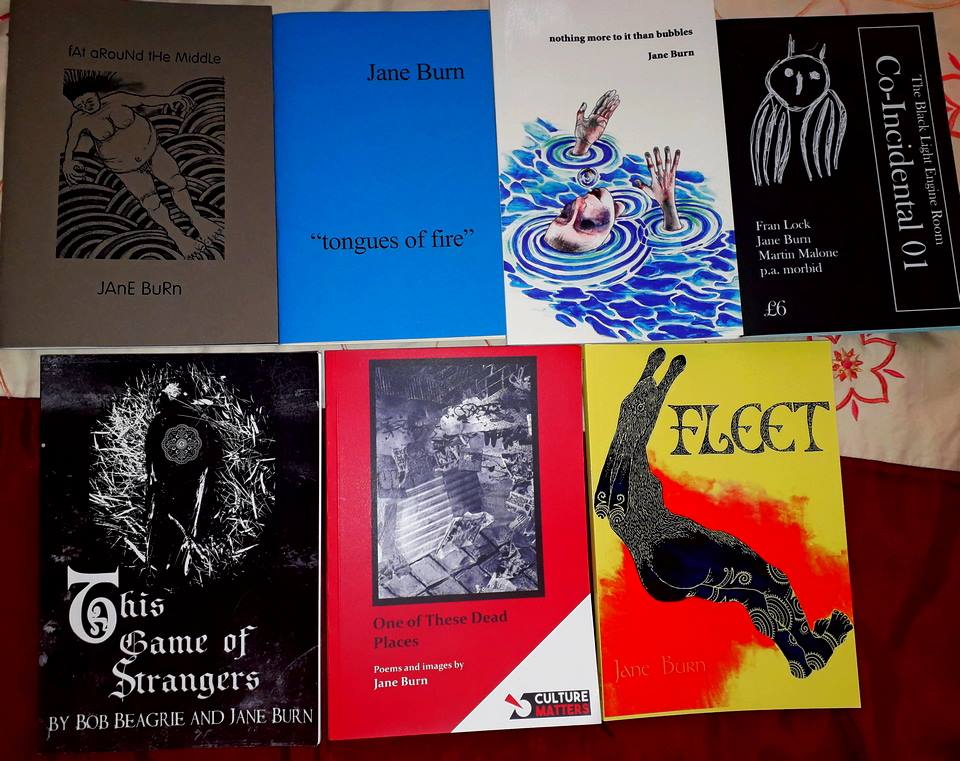
JANE BURN – POETRY AS HARD GRAFT, INSPIRATION, REACTION OR EXPERIMENT?
I interviewed poet & artist Jane Burn who won the Michael Marks Environmental Poet of the Year 2023-24 with A Thousand Miles from the Sea.
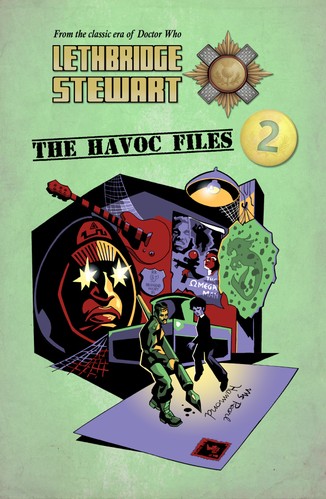
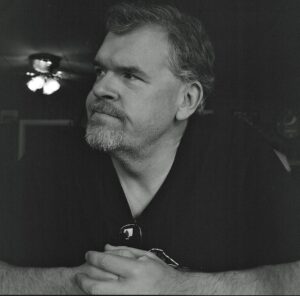
In part two of his interview, author and senior NASA media writer Rick Cross talks about his creative methods, his struggles with personal illness and the humane face of science.
Leslie: How as an author do you go about finding ideas and making your themes ‘scientifically plausible’?
Rick: I suppose the idea part comes the way it does for nearly every writer: I entertain internal fantasies about situations, unspool these little mind-movies in which unlikely scenarios unfold behind my eyes. Sometimes there’s not much there: a single image or moment, a snapshot. And sometimes things will play out at length, over time. In college once, heading to our student union building to start my shift at our college radio station (WWVU-FM at West Virginia University, a marvelous independent student station!), I realized to my horror I was more drunk than I’d meant to be. It was college, it was summer, the station manager went easier on the overnight deejays than he did the daytime crew — but still, I was colossally drunk… and only just sober enough to be chagrined about it! I stepped into the building, meaning to go splash water on my face before going into the station proper to relieve the deejay on the air. And at this point in 1989, our student union building was under reconstruction, loaded with massive piles of building materials under tarpaulins and the like. The whole place was dark and creepy and strange, with these billowing blue tarps everywhere. And coming round a bend, I could have sworn I saw… something dart away into the darkness far off on the other side of this massive thoroughfare. Normally, in the day, there’d be a hundred students crossing that lobby. Tonight it was just me — and whatever had just passed out of my range of vision. I crossed the lobby, all the time getting more and more spooked. I was convinced what I’d seen was something gliding through the air. And looking at the flowing blue tarpaulins, which had a sort of rocky, underwater outcropping feel to them, I started thinking Flying shark. You saw a flying shark.
I was drunk, of course, and it was the silliest notion imaginable — but by the time I got to the far end of the lobby I was practically running. The hair had stood up on the back of my neck and I was convinced something was about to come nosing out of the dark at me, moving with a speed I couldn’t match. I got inside the radio station, slammed the door behind me… and found a very annoyed fellow deejay standing there glaring at me and looking at the clock. That moment became the basis for a story I first tried to write in college, but only successfully managed to turn into a real novella some years later. And it started as a simply irrational notion I’d had while drunk.
What stumped me for years was that second part of your question — the scientific plausibility. How could such a thing happen? How could a shark fly through the air, let alone appear in a landlocked school building hundreds of miles from its natural habitat? I tried to write that idea a dozen different ways, and the story failed every time. Then I finally threw out the why and the how, and just let the tale tell itself. Never mind where the shark had come from. Never mind what kept it aloft, or brought it to this particular place. What was important was the mood of the piece. The atmosphere. What did the shark want? What did it do? And that worked a treat. In fact, ironically, once I’d quit thinking altogether about the how and the why, I actually did come up with a strange sort of explanation for that weird monstrosity lurking in the bowels of the student union — though it’s a fantasy explanation for sure, not a hard science fiction one! That explanation itself has since led me to even more curious ideas that I still hope one day to turn into a full novel. But I don’t think scientific plausibility should ever stymie a potentially captivating idea. If you can’t find the why, I say write the story a different way. Forego the hard SF angles and deliver something softer but equally compelling, something that dwells on the emotional content of the story rather than its prospective technical potential or real-world applicability or realism. And if that doesn’t work, go for fantasy rather than SF. The tale’s the main thing, not the manner in which it’s told! (And I hope very soon to post that flying-shark story to my author page on Facebook, so anyone interested, please “Like” the page and watch for the story — and let me know what you think!)
That said, if there are science or technology advances that can be applied to your SF work, then by all means, put in the time and effort and do the research. Find the connections between what may be yet to come and how it connects appropriately and satisfyingly with the scenarios you’re trying to create, the themes and ideas you’re trying to convey. Hard work never hurts any author, and can only help the fiction. But if you’ve toiled at a 9-to-5 writing job all day, and come evening you just can’t face spending another minute exploring scientific data online, you’re hereby forgiven if you forego a proper scientific explanation for the fanciful flying shark you’ve sent zipping around a darkened hall devouring the janitors!
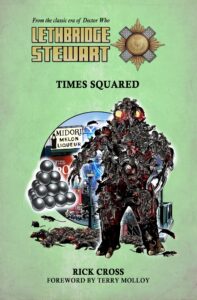 Leslie: How did those considerations play out in Times Squared?
Leslie: How did those considerations play out in Times Squared?
Rick: When it came time to consider plausibility for Times Squared, I was fortunate in that I was working with characters and situations previously outlined by the TV series and the earlier writers among the novels. So I didn’t have to worry too much about coming up with ‘smart science’ to sell my story. That said, I was always intrigued about the actual origins of the robot Yeti themselves, these hulking monstrosities built in Tibet by… a bunch of monks? I started thinking about my own contractor lifestyle at NASA and thought “What if Padmasambhava (the old monk possessed by the Great Intelligence in the TV episode ‘The Abominable Snowmen’) hired or conscripted someone, a prolific toymaker of some kind, to construct these complex robotic creatures on his behalf?” That’s how I came up with the character of Jemba-Wa. And the more I thought about him, the more he was transformed from arch-villain into a very human, very relatable fellow whose life hadn’t turned out quite as he’d planned… who’d been promised the opportunity to craft amazing creations unlike anything the world had ever seen, but who actually ended up enslaved to a tyrannical force, locked into a path he almost certainly would not have chosen for himself. He’s by no means innocent — he’s responsible for a lot of death and anguish in Times Squared (and, one must surmise, in ‘The Abominable Snowmen’ and ‘The Web of Fear’ as well) — but in the end, he becomes a very relatable character, I hope. Someone the reader empathises with to some degree. Thus, sometimes, is the thankless life of the behind-the-scenes contractor! Ha!
Leslie: What’s your view on the relative merits of ‘hard’ and ‘soft’ sci-fi?
Rick: Ah, this is where my failings as a science fiction writer become self-evident! I was never a mathematical or scientific whiz in school, and though I firmly believe, as I said earlier, that a good writer can write about literally anything if he or she applies talent and training to the task, coming to work for NASA only reinforced that I am in no way an intellectual ball of fire. But my journalism training made me a good student of research, and that was my salvation. I do have a pretty good grasp of basic scientific concepts and the like, and I can do solid, thorough research and ask enough smart questions to ensure I’m able to translate even the most complex engineering and scientific principles and technologies into language any lay-reader can understand, but when my engineers start talking excitedly and lapse into what we call ‘NASAspeak’, which is loaded with acronyms and terminology such as delta-V and magnetohydrodynamics and the like, I can feel my brain beginning to overheat. When that sort of thing happens, I tend to automatically retreat from the wonders of space and science fiction into the much simpler and more satisfying world of fantasy!
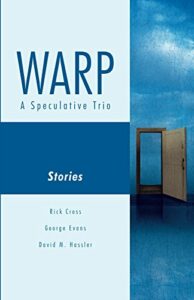
Don’t get me wrong — I do appreciate so-called “hard SF.” The superb British SF novelist Stephen Baxter is a writer whose very technical science fiction hasn’t daunted me, whose novels I still read compulsively even when I get lost in the complexities of his prose. That happens a lot, and I confess I do now and again end up putting down other novels when all that hard-SF jargon gets to be too much. But the best writers get you over your fears, or your shortcomings, and Baxter is one of those: I keep reading his stuff even if my grasp of the science wavers, because his writing is so damned good. And I know he’ll come back round to safer ground before long; his novels are never one long technological manifesto, but science interwoven with human experiences and insight, what-ifs grounded in an identifiable humanity as thoroughly as they are grounded in the far edges of scientific possibility. That is how I like my SF: mixed up with humanism and compelling prose that speaks to me even when the math flies right over my head!
But yes, mostly I flee back to softer SF — writers such as Bradbury, no less sweeping of scope and idea, but written at a level far easier to grok, as it were — or into fantasy as well, Tolkien and the like. Though to be fair, I read Tolkien far too young, mainly because I was smitten with the animated adaptations on American TV and movies back in the day (the Rankin-Bass animated The Hobbit was enchanting; Ralph Bakshi’s animated film effort of Lord of the Rings less so), and after devouring C.S. Lewis’s Narnia books, Tolkien’s works were the next logical footstone along the fantasy path. The Hobbit is a fine read for young teens, but Lord of the Rings? Whew. It read like the driest history text when I was 13 or so! And don’t even get me started on The Silmarillion, which reads like the Biblical ‘begats!’ I’d come to appreciate the beauty of Lord of the Rings (and Tolkien’s remarkable linguistic achievements) a few years later, but at that time, much of my enthusiasm for the literary series was forced.
It was interesting, dancing back and forth from science fiction, where the hard stuff left me in a cold sweat, to fantasy, where the most complex, lore-heavy epics lost me in the footnotes! For that reason, I always come back to Ray Bradbury as the perfect middleman. This is the fellow who wrote Fahrenheit 451, one of the greatest, most thought-provoking science fiction novels in history, but also Something Wicked This Way Comes, a sweeping, allegorical fantasy like no other when I was a boy (and an even more moving one now that I see the world more through Charles Halloway’s eyes than those of his son Will). Bradbury straddled the line magnificently and swept readers away on a current of language that eschewed SF jargon and technicality and likewise ignored the complex, made-up tongues and ridiculous naming conventions of so much of popular fantasy. He worked so beautifully with his own language, our shared language, whatever genre he chose to work in. For that reason, he’s still my own personal grand master!
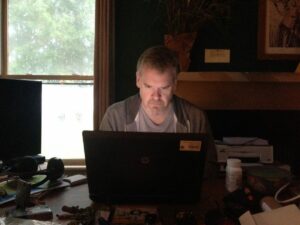
Leslie: You have an interest in advanced/corrective surgery. Could you describe your personal experience and thoughts about where this branch of science is leading?
Rick: I had a chuckle at this. It was an ‘interest’ in 2005 or so. These days, it’s a rather desperate, fingers-crossed daily yell at the cosmos for new solutions! Backstory: In 2004, I had a fairly simple back surgery to correct a bulging disk… during which I contracted staph in my spine and nearly died. I spent 10 weeks in bed battling that terrible infection, which led to degenerative disk disease in my vertebrae and five more major spine surgeries. No more staph, thank goodness, but one operation included a botched disk fusion which ended up badly scoring the nerves in my legs, resulting in muscular deterioration and permanent nerve damage, which forced me to walk with a cane to keep me from occasionally pitching over on my face! Then in 2013, I began battling what doctors first thought was chronic pancreatitis. After two miserable years, during which I sloughed off almost 100 pounds, I went to the marvelous folks at the Mayo Clinic in Florida for surgery. They discovered precancerous material laced all through the pancreas and removed it completely, along with my spleen, then rebuilt my digestive tract from my stomach to my colon. I became an instant diabetic, but given that the alternative was guaranteed full-blown pancreatic cancer and the high probability of death by 2017-18, I accepted the diabetes!
These days I still use the cane, and now I take something like 35-40 pills a day (to deal with the enzyme-replacement for the lost pancreas, among other things). I have terrible pain in both legs and my lower back most of the time, regardless of my level of activity, but I’m looking into potential new remedies for that, including insertion of a spinal cord stimulator to shut down those haywire ‘pain’ signals constantly firing in my legs. Knock on wood!
It’s exciting to watch new advances being made all the time in the area of pancreas replacement, including actual, artificial organs. Amazing! I’m meeting a doctor in April who himself had pancreas tissue replacement earlier this year, so I’m keen to learn more about that. Mainly because it’s always refreshing to talk to a doctor who actually has experienced the condition you’re there to see him or her about. With most doctors, you find yourself wondering if they truly understand the kind of pain you’re trying to explain to them, or anything equivalent. I’m eager to meet one who definitely has done so.
Technology continues to expand in amazing new leaps and bounds — and it’s thrilling to see NASA play a role in this arena too. A while back, we patented new LED medical technology, developed for spaceflight to help pursue plant growth in orbit, which has been proven to successfully aid healing among bone-marrow transplant patients. I mean, imagine that! That’s pure science at its finest there. No direct correlation, no one was thinking, ‘Perhaps we can use this to alleviate the suffering of certain cancer patients’. But someone brilliant had a moment of clarity, thought around a particular bend, and said to themselves, ‘You know, if this technology has this effect, it might also do that’. Some research dollars applied, some practical experiments by a partner medical center, and there you have it — scientific research delivers amazing, new, real-world application. Is there anything more exciting than that? I’m confident we’ll only continue to progress in this arena. New transplant capabilities, new artificial organs, eventually whole new limbs and who knows, perhaps one day something even more. Since my back problems began, and especially since they were compounded by the pancreatectomy, I like to joke with my NASA tech friends, “Where’s my cybernetic body? When are you guys going to perfect an artificial body?” It’s probably not that far off. And if it happens in my lifetime, sign me up. I’ll be the first to joyfully shed this dilapidated old husk and don my cybersuit. (Of course, saying that as a Doctor Who fan, I realize the first correlation that comes to mind is the Cybermen! Not such a great precedent there! But hopefully we’ll keep the human mind fully intact and never surrender the thing which makes us human in the first place: the brain. The intellect. Humanity must endure!)
Leslie: Why do you write?
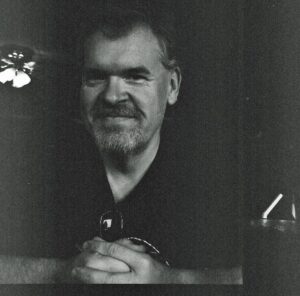
Rick: That’s easy. I write because it’s as organic and innate to me as breathing in and out. I could no more do without writing than I could without oxygen! As a child, I was a late bloomer, very short and very heavy, with a bit of a stammer. I found myself struggling to speak at times, to be heard — but I could always get my thoughts down in print, vividly and clearly. And often as not, people seemed to respond to those written thoughts, whether it was fiction or nonfiction, an essay or a piece of prose, upbeat or sad or whatever emotional spectrum I’d intended for it to cover. Writing is how I’ve always most successfully entered the world, made my place in it, and how I continue to try to make sense of it. And that remains absolutely true to this day.
Rick Cross is the author of Times Squared and coauthor of Warp: A Speculative Trio and The Havoc Files 2, and the senior media writer for NASA’s Marshall Space Flight Center. You can reach him by email at rickcross@bellsouth.net.
Next week, I interview expert cake-painter Natasha Collins about the creative and practical skills that go into her range of painted ‘Nevie-Pie Cakes’
ABOUT LESLIE TATE’S BOOKS:

I interviewed poet & artist Jane Burn who won the Michael Marks Environmental Poet of the Year 2023-24 with A Thousand Miles from the Sea.

I interviewed ex-broadcaster and poet Polly Oliver about oral and visual poetry, her compositional methods, and learning the Welsh language. Polly says, “I absolutely love
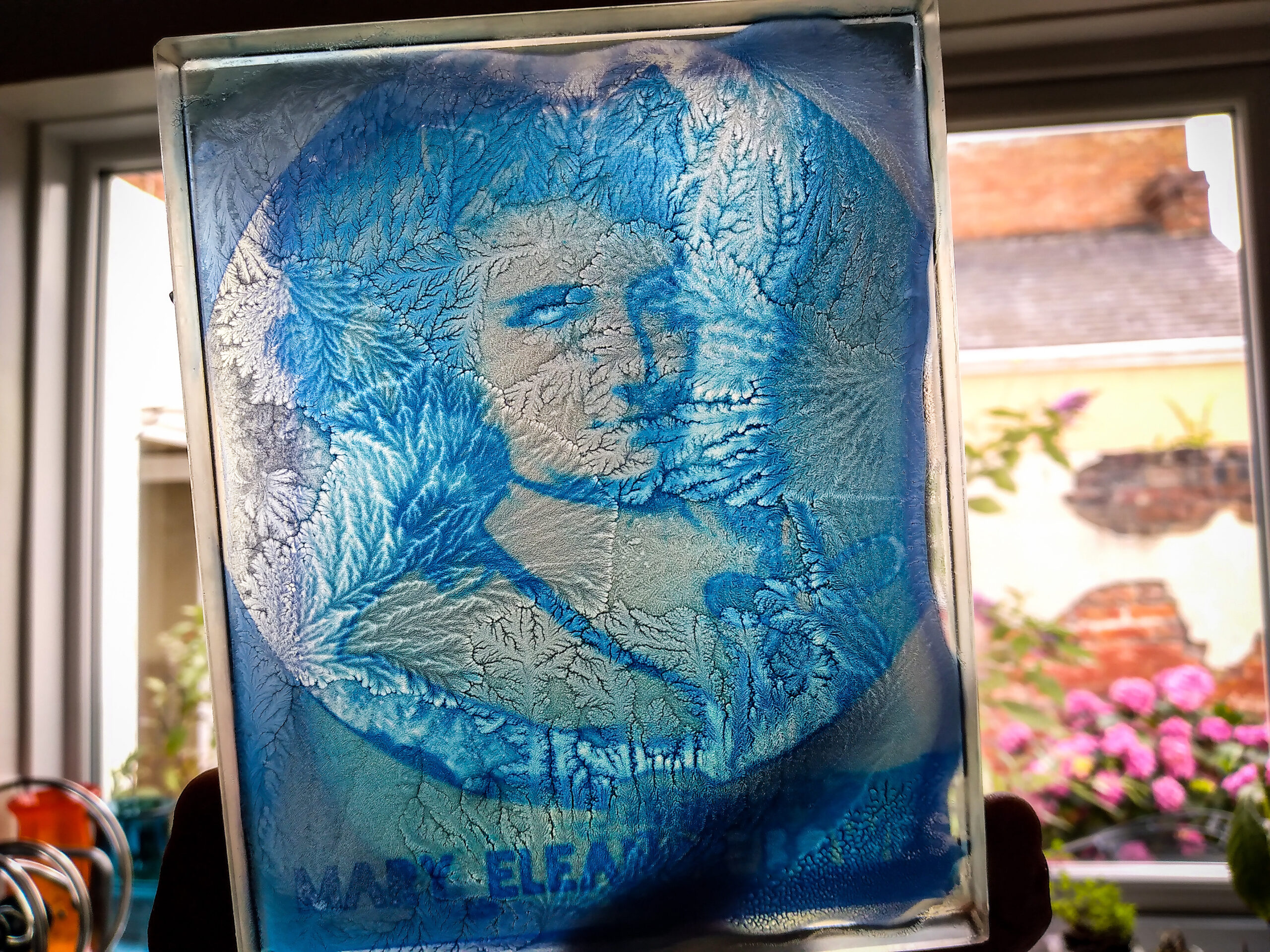
I interviewed Jo Howell who says about herself: “I’ve been a professional photographic artist since I left Uni in 2009. I am a cyanotype specialist.
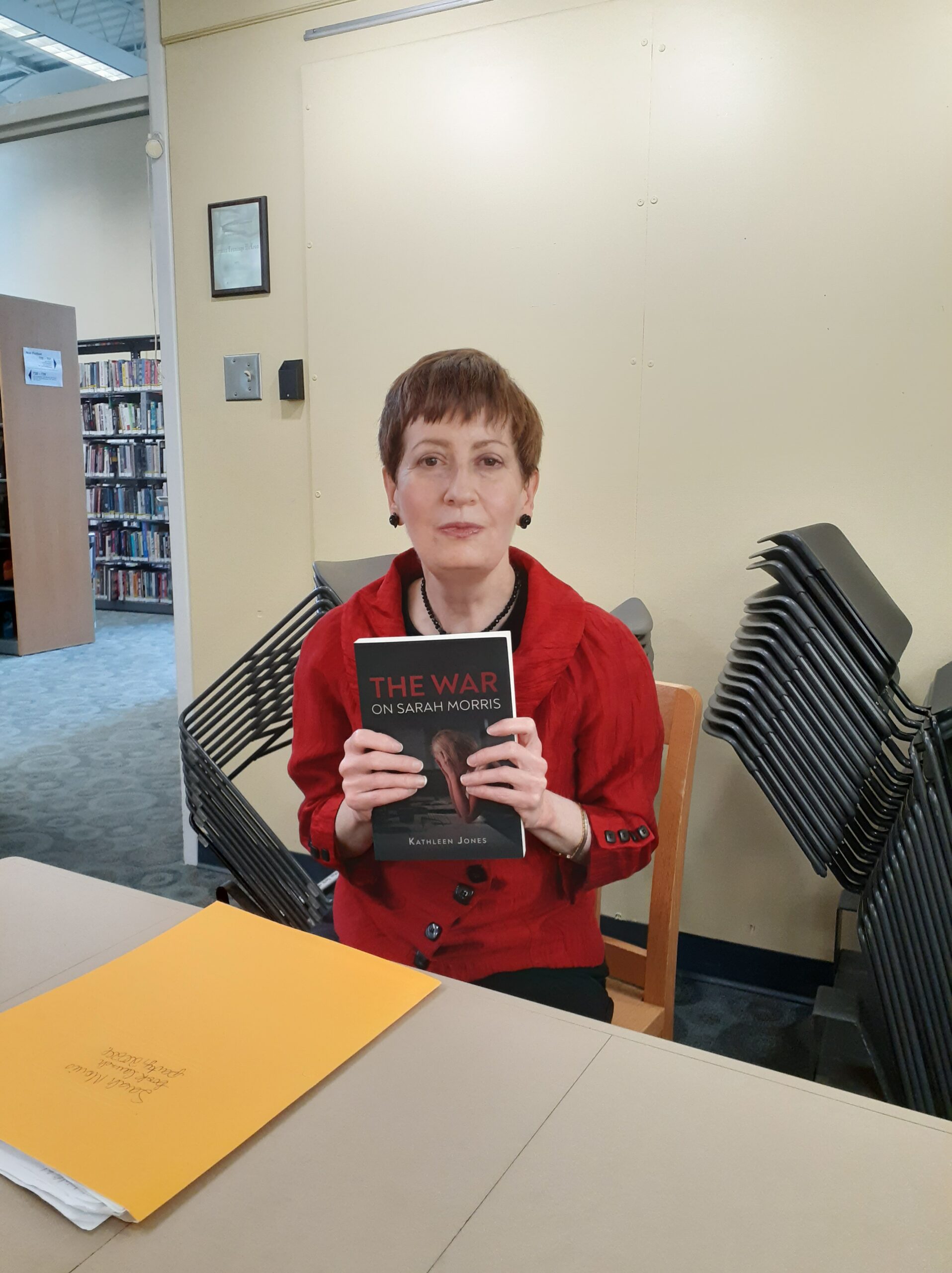

Poet Tracey Rhys, writer of Teaching a Bird to Sing and winner of the Poetry Archive’s video competition reviews Ways To Be Equally Human. Tracey,
| Cookie | Duration | Description |
|---|---|---|
| cookielawinfo-checkbox-analytics | 11 months | This cookie is set by GDPR Cookie Consent plugin. The cookie is used to store the user consent for the cookies in the category "Analytics". |
| cookielawinfo-checkbox-functional | 11 months | The cookie is set by GDPR cookie consent to record the user consent for the cookies in the category "Functional". |
| cookielawinfo-checkbox-necessary | 11 months | This cookie is set by GDPR Cookie Consent plugin. The cookies is used to store the user consent for the cookies in the category "Necessary". |
| cookielawinfo-checkbox-others | 11 months | This cookie is set by GDPR Cookie Consent plugin. The cookie is used to store the user consent for the cookies in the category "Other. |
| cookielawinfo-checkbox-performance | 11 months | This cookie is set by GDPR Cookie Consent plugin. The cookie is used to store the user consent for the cookies in the category "Performance". |
| viewed_cookie_policy | 11 months | The cookie is set by the GDPR Cookie Consent plugin and is used to store whether or not user has consented to the use of cookies. It does not store any personal data. |
One Response
A lovely post Rick and Leslie. I have liked Rick’s Facebook page as I want to read the shark story. I don’t think there needs to be a rational explanation for science fiction and fantasy phenomenon in stories. The story of Rick’s health is astounding. I agree with his point about the pain. My older son also had huge physical problems and has had 18 operations. We still struggle.